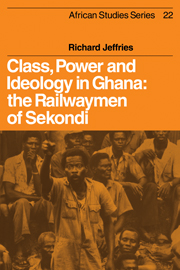Book contents
- Frontmatter
- Contents
- List of maps and tables
- Acknowledgements
- Introduction
- Part I A political history of Ghanaian railway unionism
- Part II Class, power and ideology
- 8 Class formation in Ghana
- 9 Power and organisation
- 10 The political culture of the railway workers
- Conclusion
- Appendix: Survey questionnaire administered to a sample of railway workers at Sekondi Location
- Notes
- Bibliography of sources cited
- Index
9 - Power and organisation
Published online by Cambridge University Press: 30 September 2009
- Frontmatter
- Contents
- List of maps and tables
- Acknowledgements
- Introduction
- Part I A political history of Ghanaian railway unionism
- Part II Class, power and ideology
- 8 Class formation in Ghana
- 9 Power and organisation
- 10 The political culture of the railway workers
- Conclusion
- Appendix: Survey questionnaire administered to a sample of railway workers at Sekondi Location
- Notes
- Bibliography of sources cited
- Index
Summary
One of the most striking aspects of post-Independence politics in the African states is the relative ease with which the ‘masses’, at one time seen as involved in a populist surge toward greater participation, have in fact been effectively excluded from active political involvement. The chief exception to this tendency, in many states, has consisted in the continuing strength of workers' organisation (whether official or unofficial) and their ability to stage major political strikes in protest at government policies. Elliot Berg and Jeffrey Butler might well be correct in suggesting that ‘political’ strikes have been the exception rather than the rule in both pre- and post-Independence Africa. Infrequent as they may have been, such political strikes as have occurred nevertheless appear significant enough within this general context of popular passivity to merit serious consideration. Arrighi and Saul, however, viewing such strikes as instances of mere ‘reformist opportunism’ and considering rural passivity to be a temporary phenomenon, insist that ‘considerable attention must continue to be paid to the emphasis of Frantz Fanon who placed his hopes for significant transformation in post-colonial Africa upon the peasantry's outrage at widening economic and social differentials’.
There are a number of reasons for considering this formulation seriously misjudged. It is hardly necessary to concur entirely with Marx's more extreme castigations of peasant passivity in order to recognise the difficulties confronting the peasantry's development of a shared consciousness, of a unifying radical ideology, or of the autonomous political organisation necessary to concerted political action.
- Type
- Chapter
- Information
- Class, Power and Ideology in GhanaThe Railwaymen of Sekondi, pp. 186 - 196Publisher: Cambridge University PressPrint publication year: 1978



